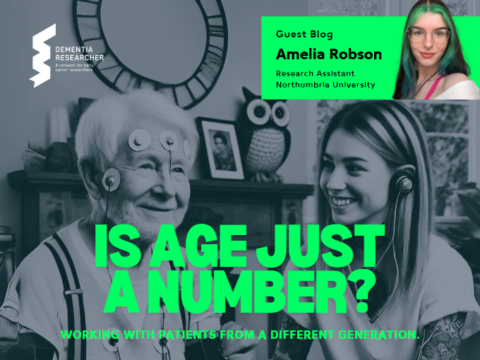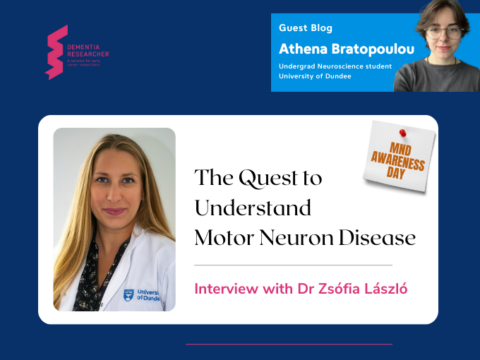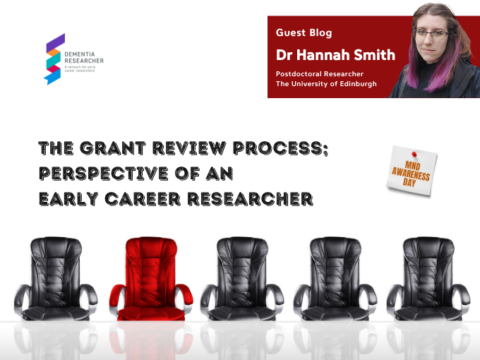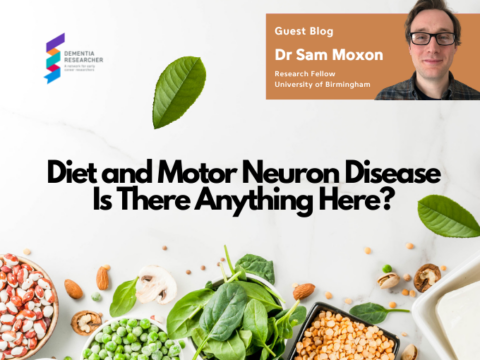I’ve been writing blogs for dementia researcher since the beginning of my PhD. I remember when I was asked if I’d be interested in writing monthly blogs and I thought what an exciting opportunity to share some of my experiences with others interested in dementia research. It’s been a wild ride from a first year PhD student to post doc and I have loved sharing my experiences with you all. Sadly, good things come to an end and this is my little goodbye blog to you all: I’ve got a new job and for the time being (hopefully not forever) it’s the end of monthly blogs from me!
As many of you know, I’ve been studying Alzheimer’s disease in some capacity since the beginning of my PhD and during my first post-doc. Towards the end of my PhD I started to become really interested in how our brain clears proteins in health and disease and this became a focus during my first post-doc position. And, my passion for dementia research and interest in brain clearance has led me to a new job in Boston USA!
I’m not leaving the field of dementia, but I’m going to be specialising my knowledge a little, and focusing on brain clearance and cerebral amyloid angiopathy (CAA). As I’m still early in my post-doc journey, I have so much to still learn and I can’t wait to keep on learning and expanding my experimental toolbox.
So, I thought why not end my final blog with a few things that I’ve learned throughout the past 4 and a half years:
‘Failed’ experiments teach you the most
When I turned up on my first day to start my PhD, I’d never done any wet lab work – NEVER. I’d not held a pipette since my A-Levels and I’d never done any of the experiments that my PhD was going to be made up of. And wow, how so much failed in my first few months. No one really prepares you for how many things won’t work when you first start – and how lots of experiments just ‘fail’. But there is so much beauty in failure (if you know why it failed). I would probably say I should not only have a PhD in psychology but I also deserve a PhD in problem solving. It’s the failed things that actually allow you to improve your techniques, collect better data, allow you to streamline your protocols etc. Yes, of course it’s wonderful when things run super smoothly, and we all need weeks where things run perfectly, but it’s those days where nothing goes right, or where you’re starting something from scratch, where things you try fail that actually help you grow and develop your skills. And yes, at the time the ‘failing’ is challenging. But now, at the end of my current journey, those days where things just didn’t work actually seem worth it.
You are totally capable, even when you feel like you aren’t and self-belief can go a long way
This one links to my own very complex journey with imposter syndrome. It’s safe to say I’ve been battling with this since the beginning of my PhD and at times during my post-doc. I’d be lying if I said it wasn’t sort of resurfacing a little as I prepare to move labs. But when I look back on all the incredible things that I’ve learned over the past 4 and a half years, it’s safe to say that I am definitely capable. And, let’s remind ourselves that nobody expects us to know everything (even if at times we feel like they might). I can’t know everything there is to know about dementia research, or the new techniques that I’m going to be learning. But what I can do is turn up with a positive attitude, and a willingness to learn.
Be kind and support the next generation
Once you’ve got your PhD and if you decide to move onto a post-doc position, you end up in this sort of weird career stage where the students think you know lots of things but where you personally don’t feel like you know enough and you just hope that things work out (at least this is my experience of a post doc anyway). I absolutely feel like at times I winged my first post doc, because it’s the first time I was doing the position and there is no real training for it. It’s basically like doing a PhD, but without the training wheels and no big important certificate at the end. However, the beauty of a post-doc is that you will be an expert at something, there will be something that you do very well and that’s probably one of the things that you were hired for. And so, at times it’s your job to pass on that knowledge to others. Throughout the end of my PhD and my first post-doc I tried where I could to support other students, to give knowledge where I could and assist with experiments and techniques where possible. And at times, I definitely felt like I wanted to do more, but due to the nature of post doc jobs, where you’re likely completing many projects, it can be hard to feel like you have the time to train people properly. I’ve chatted with friends who also have post docs in different fields and we seem to have similar experiences of the plate juggling and switching between many different things. At times, it can definitely feel like you’re being pulled in many directions, and this is something I’m definitely going to work on dealing with in my next role. But the beauty of becoming a post doc is that you are seen as someone who can do the things and it’s actually super rewarding passing on that knowledge to others. So, as I develop my mentoring style over the next few years one of my goals is to be continue to be kind, and support the next generation of researchers – because I remember what it was like, starting as a first year PhD student.
It’s incredible how much you change during these really important early research training years, but to see the growth is pretty incredible. I’m super excited for my next adventure and post-doc in the USA and I can’t wait to hopefully tell you all about it some point soon. So, finally, I’d like to end with a huge thank you to you all for reading my blogs about my journey over the past few years and I wish you all the best of luck with your dementia research journeys!
After a little more than 3 years, and 32 blogs charting the early days of her PhD to finding a great postdoc position, it has been wonderful to work with Beth. We hope you will join us in thanking her for taking us along with her on her PhD journey – post your comments below and leave a review.

Beth Eyre
Author
Beth Eyre is a Postdoctoral Researcher (Dr pending minor corrections) at The University of Sheffield, researching Neurovascular and cognitive function in preclinical models of Alzheimer’s disease. Beth has a background in psychology, where she gained her degree from the University of Leeds. Inside and outside the lab, Beth loves sharing her science and we are delighted to have her contributing as a regular blogger with Dementia Researcher, sharing her work and discussing her career.

 Print This Post
Print This Post





We hope you will join us in thanking Beth for taking us along with her on her PhD journey. 3.5 years and 33 blogs, brimming with help and advise for others. Thank’s Beth, and enjoy your time in the US.
Good luck Beth, enjoy this very exciting new chapter ahead. Thank you for your illuminations into experiencing imposter syndrome – the more we talk about it, the less it’ll happen!